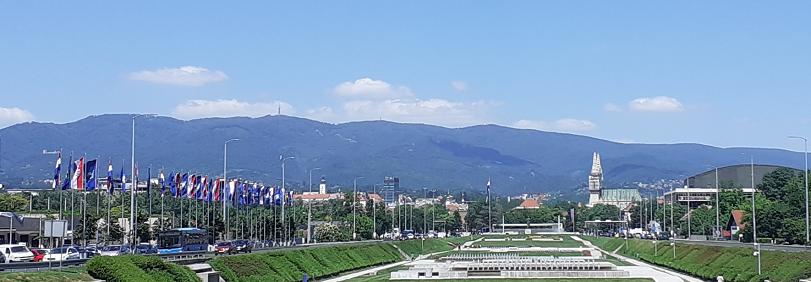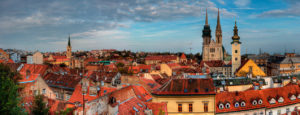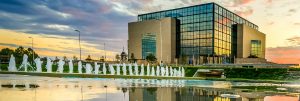
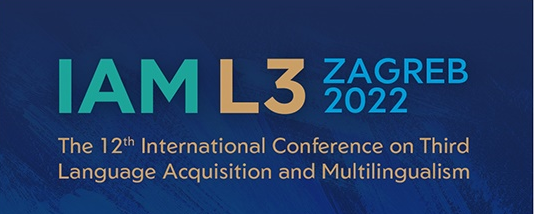
15-17 September 2022
Zagreb, Croatia
CONFERENCE SCHEDULE
| * Please find the conference book of abstracts here (permanent link in FFZG repository). |
| * THE PRE-CONFERENCE PhD workshop program, 14 SEPTEMBER 2022 (ver. Sept 13) |
|
* [IAML3 2022] Conference Schedule – download PDF (ver. Sept 13) |
***
IAML3 CONFERENCE
THURSDAY, 15 SEPTEMBER 2022
08:30-09:00 REGISTRATION (LIBRARY LOBBY)
09:15-09:30 CONFERENCE OPENING (lecture hall D7)
09:30-10:30 PLENARY TALK: DANUTA GABRYŚ-BARKER, University of Silesia, Faculty of Humanities: A diachronic perspective on multilingualism: past, present and future (lecture hall D7; presenter: Pilar Safont)
10:30-11:00 COFFEE BREAK (LIBRARY LOBBY)
|
ROOM D1 |
ROOM D2 |
ROOM A105 |
ROOM A106 |
|
|
Symposium: Engaging with Dominant Language Constellations (DLCs) in the North (convenor: Nayr Ibrahim) |
CHAIR: Greg Poarch |
CHAIR: Jorge Pinto |
CHAIR: Magdalena Wrembel |
|
|
11:00-11:30 |
Duggan & Krulatz: Evolving DLCs and identity transformation in multilingual transnational couples |
|
|
Sypiańska & Cal: L2 as a source for cross-linguistic influence in L3 but not L4: front and back rounded vowels by quadrilinguals |
|
11:30-12:00 |
Haukås, Storto & Tiurikova: Mapping multilingual practices and beliefs in Norwegian lower secondary schools |
Berchio, Berthele & Bonvin: Third/fourth languages as predictors of information structure in event descriptions? |
Cortes Velasquez, Donato & Ricciardelli: Spanish as Pivot Language between Italian mentors and US Heritage Spanish Speaker mentees in Telecollaboration |
Gabriel, Grünke & Schlaak: Acquiring Spanish rhotics against the backdrop of migration-induced multilingualism: the case of German-Turkish learners |
|
12:00-12:30 |
Ibrahim: Teachers discovering and embracing their DLCs – a concrete and visual pathway to multilingual classrooms |
Wolf: It’s the economy…how to model effects of processing preferences in a multilingual brain? The example of gustar-like verbs in Spanish as a L3. |
Santos: Teachers ́ perspectives on communicative anxiety and pedagogical translanguaging |
Stoehr, Jevtović, de Bruin & Martin: Regressive phonological transfer in early bilingual Spanish-Basque learners of English |
|
12:30-13:00 |
Xu: Detecting DLCs in EFL teachers’ lives: navigating teaching practices in multilingual classrooms |
Ruiz de Zarobe: Learning strategies across skills: A multilingual project on reading |
Saloranta & Heikkola: Is intonation linked to comprehensibility in L3 pronunciation? |
13:00-14:00 LUNCH BREAK (LIBRARY LOBBY)
|
|
ROOM D1 |
ROOM D2 |
ROOM A105 |
ROOM A106 |
|
|
CHAIR: Irena Zovko Dinković |
Chair: Stela Letica Krevelj |
CHAIR: Joachim Schlabach |
CHAIR: Ana Petravić |
|
14:00-14:30 |
Lorenz: Tense and aspect and cross-linguistic influence – analysis of L2 and L3 learners of English |
Singleton & Záborská: Language learners telling stories |
Karpava: Multilingualism and Translanguaging Space in Cyprus |
Walsweer, Pulles & Hiddink: Plurilingual Dialogic Education in Fryslân |
|
14:30-15:00 |
Długosz: Cross-linguistic influence in the comprehension of reflexive possessive pronouns in L3/Ln |
|
Nightingale & Castelló: Affective factors in interlingual romantic relationship and their impact on the perception of EMI |
Bergstra, Günther & Duarte: A holistic approach to multilingualism in secondary education |
|
15:00-15:30 |
Fernándes-Berkes & Flynn: Development of infinitival complementation in the acquisition of multilingual learners of L3 English |
Letica Krevelj & Kovačić: If you mind, it does matter? Defining DLCs in consecutive multilinguals’ repertoires |
Janík, Goldberger, Janíková & Veličková: Balancing between diversity and homogenization: Investigation of language regimes at four multilingual schools |
Günther & Duarte: Translanguaging and EFL: an intervention project for multilingual education |
|
15:30-16:00 |
Alexandre & Pinto: Relative Clauses in a Multilingual Class |
van Zyl: The lecturer as a linguistic landscape: a linguistic ethnographic description of lecturers in multilingual higher education classrooms |
Björklund & Björklund: DLC as a tool to document, describe and develop the multilingual state, tensions and potential in teacher practices in Finland |
Dekker, Kootstra, Loerts, & Duarte: Towards a Typology of Attitudes, Knowledge and Skills within Educational Dominant Language Constellations |
16:00-16:30 COFFEE BREAK
|
|
ROOM D1 |
ROOM D2 |
ROOM D3 |
HALLWAY IN FRONT OF D1&D2&D3 |
|
|
Symposium: Philosophy of Multilingualism (convenors: Larissa Aronin and Alfred Nordmann) |
CHAIR: Agnieszka Otwinowska
|
CHAIR: Romana Kopeckova
|
POSTER SESSION |
|
16:30-17:00 |
Nordmann: The philosophy of multilingualism: finding the way |
Mizukura, Llurda & Calvet-Terré: Language teachers’ identity: Exploring the conflict between nativespeakerism and translingualism |
Safont: The pragmatics of email requests and openings in a multilingual educational setting |
Horvatić Bilić: Fremdsprachenlehrkräfte und ihre Verbände als Akteure der Sprachenpolitik – am Beispiel der Deutschlehrkräfte
Jajić-Novogradec: The positive impact of child’s metalinguistic awareness on the acquisition of a new foreign language – Russian as L4
Li: A Positive Psychology Perspective on Multilinguals’ Language Learning Experience: What Can We Learn from the PERMA
Waters: The expression of voluntary motions by quadrilingual children – A case study |
|
17:00-17:30 |
Aronin: The philosophy of multilingualism: defining the field |
Marx: Endangered Species “Bilingualism”? How we Spin Constructs to Suit our Purposes |
Pfenninger: Emergent bilinguals in a digital world: A dynamic analysis of long-term L2 development in (pre)primary school children |
|
|
17:30-18:00 |
Komorowska: Languages across Selves and States: When Multilingualism faces Politics – Some Ethical Issues |
Berthele: Taming the fluid speaker: Reengineering multilingualism as a natural category |
Troha, Šenjug Krleža & Petravić: Entwicklung der Mehrsprachigkeit in der Pflichtschulbildung – Deutsch vs. Englisch als L2 |
18:00 RECEPTION (Faculty garden)
IAML3 CONFERENCE
FRIDAY, 16 SEPTEMBER 2022
09:00-09:30 REGISTRATION (LIBRARY LOBBY)
09:30-10:30 PLENARY TALK: JASON ROTHMAN, UiT the Arctic University of Norway and Universidad Nebrija: Transfer (especially) at the Initial Stages of Third Language Acquisition, Theory Building and the Spectrum of Multilingualism: The Implication of Solid Bases and Scratching Heads (lecture hall D7; presenter: Magdalena Wrembel)
10:30-11:00 COFFEE BREAK
|
ROOM D1 |
ROOM D2 |
ROOM A105 |
ROOM A106 |
|
|
Symposium: Multilingualism in diverse educational settings: the cases of Austria, South Tyrol/Italy and South Africa (convenors: Susan Coetzee-Van Rooy and Ulrike Jessner) |
CHAIR: Pilar Safont |
CHAIR: Simone Pfenninger |
CHAIR: Silvia Melo-Pfeifer |
|
|
11:00-11:30 |
Jessner: Introduction to European contexts: Multilingualism in Austrian and South Tyrolean education: A view across all levels |
Portolés & Martí: The interplay of individual factors in defining L3 teachers’ beliefs about multilingual education |
Reiser-Bello Zago & Berthele: Lexical development in narrations of trilingual children |
Kresić Vukosav: Identity in multilingual contexts: the example of Croats in Germany |
|
11:30-12:00 |
Coetzee-Van Rooy: Introduction to African contexts: Multilingualism in South African education |
Neokleous: “A motivating force”: Learner and in-service teacher attitudes towards translanguaging in increasingly multilingual classrooms in Cyprus |
Tachakourt: The more, the better? An investigation of the impact of multilingualism on statistical word learning |
Marinov Vranješ, Soulé & Cots: Study abroad: an affordance or a constraint in the development of plurilingual identity |
|
12:00-12:30 |
Hofer: Early Multilingualism (South Tyrol/Italy), Title: Assessing components of multilingual competence |
Kekki, Repo & Heikkola: Pre-service teachers’ reflections on the roles of language in learning |
Foryś-Nogala, Broniś & Janczarska: Cognitive aptitudes and L3 acquisition: Insights from a study using a novel miniature language, MiniItaliano |
Haukås & Borlaug: Exploring collaborative data analysis in research on, with and for multilingual language teachers |
|
12:30-13:00 |
Allgäuer-Hackl, Meirer & Schlabach: Multilingualism at secondary level II (Austria), Title: “Using many languages is part of my everyday life”: Plurilingual teaching and multilingual learning approaches at upper secondary level |
|
Dolas & Jessner: Relationship between Metalinguistic Awareness, Working Memory and Linguistic Giftedness: A DMM Perspective |
Morea: “If I’m not fluent, then it’s not worth anything”: Fostering pre-service teachers’ multilingual identities during teacher education |
13:00-14:00 LUNCH BREAK
|
|
ROOM D1 |
ROOM D2 |
ROOM D3 |
ROOM A105 |
ROOM A106 |
|
|
Symposium: Multilingualism in diverse educational settings: the cases of Austria, South Tyrol/Italy and South Africa (convenors: Susan Coetzee-Van Rooy and Ulrike Jessner) |
CHAIR: Nayr Ibrahim |
CHAIR: Pernelle Lorette |
CHAIR: Larissa Aronin |
CHAIR: Marijana Kresić Vukosav |
|
14:00-14:30 |
Fakude: Multilingualism at high-school and university level (South Africa), Title: English-Sepedi reading in school and at university in South Africa |
Müller-Lancé, Kropp & Eibensteiner: Cross-linguistic vs. traditional teaching methods: an intervention study |
Gastmann, Öwerdieck, Stier, Schimke, Hopp & Poarch: Differences between adolescent L2 and L3 learners in sentence processing |
Balas, Wrembel, Krzysik & Lewandowska: A multi-feature analysis of speech perception in multilingual learners: a longitudinal perspective |
Mostert: Family Language Policies: Opting for Afrikaans in English dominant South Africa |
|
14:30-15:00 |
Pienaar: Multilingualism at university level (South Africa), Title: “I need to switch to my English brain first!” Strategies and mechanisms employed by Afrikaans-English bilingual first-year university students |
Paquet & Woll: Developing crosslinguistic awareness of adult L3 learners of French through plurilingual consciousness-raising tasks |
Otwinowska-Kasztelanic, Foryś-Nogala, Ambroziak, Silva, Broniś & Janczarska: Does cumulative L1-L2-L3 lexical similarity impact learners’ L3 word knowledge more than L2-L3 similarity? |
Cal & Wrembel: Categorising perception of VOT continuum in multilingual learners |
|
|
15:00-15:30 |
Final discussion |
Woll: How crosslinguistic awareness-raising in German (L3) impacts the pedagogical stance of student ESL teachers in Quebec |
Berényi-Nagy & Győri: Multilingual metonymic competence: On the role of figurative thinking in third language acquisition
|
Weckwerth, Wrembel & Balas: Investigating multilingual vocalic space: Spectral overlap and separation in three vowel systems |
Barnes & Almgrem: Multilingual learning about language acquisition in the Basque Autonomous Community of Spain |
|
15:30-16:00 |
|
Horváth & Jessner: The effects of raising multilingual awareness: Teaching German through English to Hungarian 9th graders. Results of the pilot project |
Agebjörn & Sayehli: Cross-linguistic influence and language-learning aptitude in L3 acquisition of functional morphology |
Gut, Kopečková & Nelson: Modelling phonological development in multilingual speakers |
|
16:00-16:30 COFFEE BREAK
16:30 GENERAL ASSEMBLY (lecture hall D7)
19:30 CONFERENCE DINNER (Restaurant Maksimir, Maksimir Park, Maksimirski perivoj 3, Zagreb)
IAML3 CONFERENCE
SATURDAY, 17 SEPTEMBER 2022
09:30-10:30 PLENARY TALK: LIDIJA CVIKIĆ, University of Zagreb, Faculty of Teacher Education: Multilingualism under the monolingual surface: the case of Croatia (lecture hall D7; presenter: Stela Letica Krevelj)
10:30-11:00 COFFEE BREAK
|
ROOM D1 |
ROOM D2 |
ROOM A105 |
ROOM A106 |
|
|
Symposium: Visualizations of Multilingualism (convenor: Sílvia Melo-Pfeifer) |
CHAIR: Lidija Cvikić |
CHAIR: Marina Grubišić |
CHAIR: Anna Krulatz |
|
|
11:00-11:30 |
Melo-Pfeifer & Aronin: The use of visual methods to envision multilingualism: epistemological, historical and methodological perspectives |
Dmitrenko: “The M-SILL Questionnaire: a new Tool for Exploring Language Learning Strategies of Multilinguals” |
Witney: Adverbial placement: Evidence of positive transfer from L2 French to L3 Spanish |
Torgersen, Krulatz & Lorenz: Teacher voices, teacher actions: Practical aspects of responsive pedagogy in linguistically heterogenous EFL classrooms |
|
11:30-12:00 |
Oštarić: What you see isn’t what they speak: Discrepancies between the written and spoken language practices in the public space of Zadar, Croatia |
De Angelis: An integrated approach to multilingual testing and assessment: assessing narrative abilities across multiple languages |
Dahl, Busterud & Faldet Listhaug: The relationship between L2 proficiency and transfer in L3 acquisition |
Alisaari, Kaukko & Heikkola: The joys of teaching language learners in Finnish classrooms |
|
12:00-12:30 |
Pereira da Costa Wätzold: “What if you had to explain how to learn Portuguese in a drawing?” – a report about visualizing the heritage language |
Hržica & Poropat Jeletić: Self-assessment of multilingual speakers as a measure of language proficiency |
Kowal: What do pauses and revisions tell us about cross-linguistic influence? A developmental perspective |
Bier & Lasagabaster: Language use and attitudes of prospective teachers: A comparison of the Basque and Friulian multilingual educational contexts |
|
12:30-13:00 |
|
Poropat Jeletić, Moscarda Mirković & Hržica: The Istrian spoken multilingual corpus: a representation of a sociolinguistic reality |
Jelić: Learning Spanish L5 in Croatian FL Education Context: A Case Study |
Villabona: Learning and Teaching Through the L3: Classroom Pedagogies and Multilingual Practices in CLIL |
13:00-13:30 CONFERENCE CLOSING (lecture hall D7)
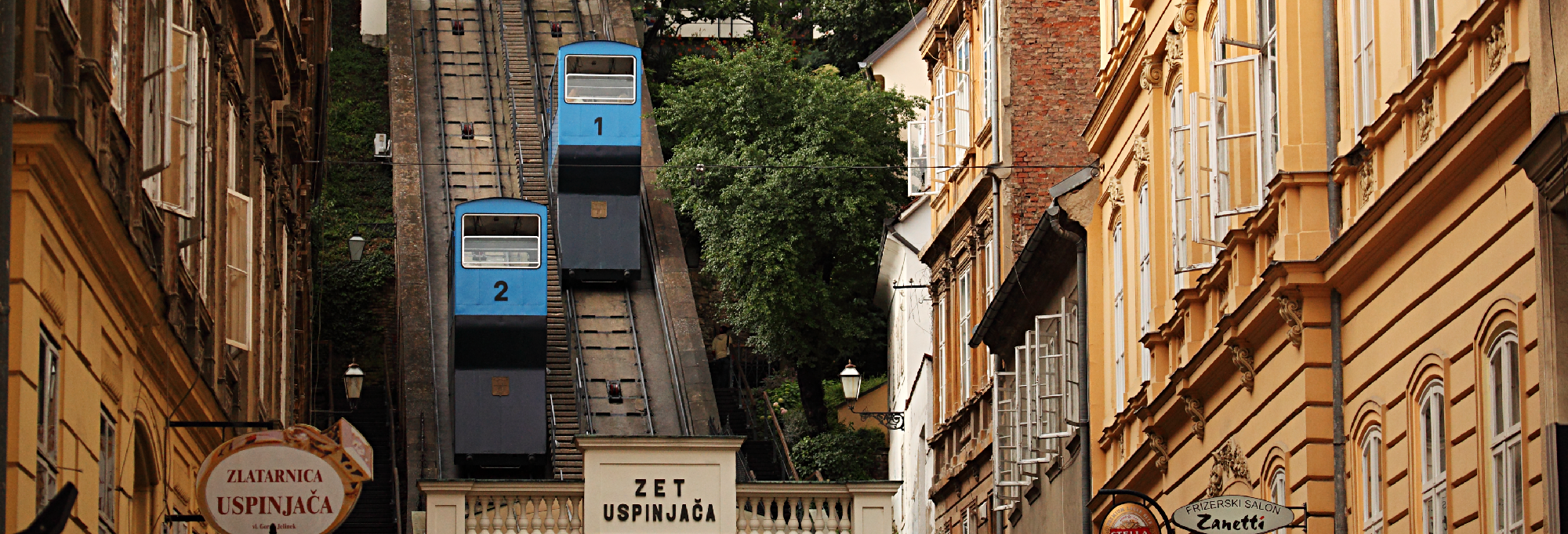
Image source: Zagreb Tourist Board, M. Vrdoljak
